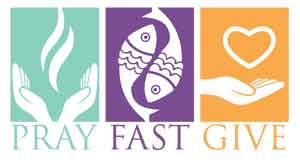 WASHINGTON, D.C. — When it comes to the three pillars of Lent, almsgiving is a little bit like the middle child, not always getting the attention that prayer and fasting do.
WASHINGTON, D.C. — When it comes to the three pillars of Lent, almsgiving is a little bit like the middle child, not always getting the attention that prayer and fasting do.
The word hardly rolls off the tongue and people don't talk about it as they might discuss what they are giving up for Lent or how they might be praying more or reading spiritual books during the 40 days before Easter.
A February editorial in America magazine described almsgiving as the "under-practiced, under-encouraged Lenten discipline" and pointed out that in the magazine's 110-year-old archives, a search for prayer and fasting in article titles had thousands of examples but a similar search for almsgiving yielded just two results.
Almsgiving is defined as donating money or goods to the poor and performing other acts of charity. The Catechism of the Catholic Church describes it as "a witness to fraternal charity" and "a work of justice pleasing to God." The practice of giving to help those in need runs through all the major faith traditions.
Christians might have good reason not to talk about their almsgiving practices since biblical warnings are pretty clear on guidelines of keeping this practice quiet.
For example, in Matthew's Gospel, Jesus has this to say: "When you give alms, do not blow a trumpet before you, as the hypocrites do in the synagogues and in the streets to win the praise of others."
But out of sight in this case should not mean out of mind.
The Old Testament is full of reminders about the need to give alms and a passage from the Book of Tobit goes a step further by saying "almsgiving saves from death and purges all sin."
So, if believers know that they should give, why isn't this discipline more of a Lenten topic of conversation?
Jesuit Father Bruce Morrill, the Edward A. Malloy professor of Catholic studies at Vanderbilt University Divinity School in Nashville, Tennessee, said one possibility is that so much of the religious practice of Lent is shaped by images that represent what people are trying to do with their faith -- ashes, for example, or fish on Fridays.
"Almsgiving is not easily recognizable," nor does it necessarily demonstrate religious devotion as prayer and fasting do with their focus on personal holiness, he said.
He pointed out that the practice of giving to those in need was not recognized for its spiritual value even in the New Testament. Jesus spoke about being asked: "Lord, when did we see you hungry and feed you, or thirsty and give you drink?" and his response was if they did this for "the least of these" they also did it for him.
Since the Second Vatican Council, Father Morrill said, the church has made more of an effort to connect worship and prayer to moral activity, and many Catholics have made the connection that fasting is not just to be pious but should have practical measures: taking the money that would have been spent on food or drink, for example, and setting that aside to give to the poor.
That is the whole idea behind Catholic Relief Services' Rice Bowl, the small cardboard box for collecting donations to help those supported around the world by CRS, the U.S. bishops' overseas relief and development agency. Since its inception in 1975, CRS Rice Bowl has raised nearly $300 million. Last year, nearly 14,000 Catholic parishes and schools across the U.S. participated in the program.
One of the suggestions on the website is to follow meatless recipes it provides from around the world and to put the money saved from not buying meat into the Rice Bowl.
Deacon Nicholas Szilagye, writing in a 2018 issue of Horizons, the online newsletter of the Byzantine Catholic Eparchy of Parma, Ohio, linked almsgiving to the other Lenten disciplines by describing it as "fasting from our income and material possessions" and saying it translates "prayers into love for each other by giving to the needy in the name of Christ."
He stressed the practice is not an optional one, but one that is required of believers, but he also lamented that it "seems to get the least attention among the three" Lenten disciplines.
The deacon suggested that people create an almsgiving plan that doesn't necessarily need to be about giving money but also could be a donation of time, energy or talents to those in need.
"Let's make almsgiving an encounter with God during Lent through the face of the poor," he wrote.
Similarly, Father Morrill stressed that when rooted in faith, the practice of caring and providing for those in need is a way of "knowing this is how you encounter and know God."
Alms might not get their due, so to speak, because Christians are hesitant to say their efforts to help others somehow earns them something, the priest said. But really, he said, they should recognize the practice is "a way to join in the generosity of God" and show the love of God for all, which is "truest when given to the least."
— Carol Zimmermann, Catholic News Service
 There is no getting around fasting during Lent.
There is no getting around fasting during Lent.
Not only is it one of the three pillars of spiritual practice along with prayer and almsgiving, but it also bookends the period of preparation for Easter.
Fasting and abstinence is required of adult Catholics, ages 18-59, at the start of Lent on Ash Wednesday and at its end on Good Friday. This means eating only one full meal and two small meals that equal one meal as well as no snacks in between meals and no meat consumption.
Creighton University's Online Ministries program, "Praying Lent 2017," says the purpose of fasting is to "experience the effects of not eating. It also serves to be a penance or a sacrifice for the purpose of strengthening us."
"When we get hungry, we have a heightened sense of awareness," it adds, noting that the practice helps people to clarify their thoughts. "It is purifying and prepares us to pray more deeply," the resource from Jesuit-run Creighton University in Omaha, Nebraska, points out.
In addition to the two days of fasting, Catholics 14 and older are obligated to abstain from eating meat during Fridays in Lent.
The Friday practice is a sacrifice meant "to help Catholics make much bigger sacrifices," the Creighton resource says, pointing out that not eating meat doesn't give someone permission to eat a fancy fish meal. And for vegetarians, it could mean abstaining from a favorite meal.
Fasting, which has deep roots in many religious traditions, is meant to draw participants into deeper prayer and also link them with those in need.
For Christians, the tradition has roots in both the Old and New Testaments. In the Gospel of Matthew, Jesus tells his disciples how they should look when they are fasting -- not gloomy, not neglecting their appearance and with their faces washed so they do not appear to be fasting.
"Jesus says when we fast, not if," said Father John Riccardo, pastor of Our Lady of Good Counsel Parish in Plymouth, Michigan.
He said the key to fasting is to attach an intention to the practice "rather than seeing it as a flexing of our self-discipline muscles." It makes the practice "not about me but someone else," he told Catholic News Service March 1.
"Fasting is heavy artillery," he added because the person doing it is denying themselves something and trusting that God will use it.
Although fasting is technically not eating food, giving something up can also be a form of fasting.
Msgr. Charles Murphy, author of the 2010 book: "The Spirituality of Fasting: Rediscovering a Christian Practice" said there are two forms of fasting -- total and partial. A total fast is eating nothing and drinking nothing for a designated period of time where a partial fast involves giving up certain things for a specific period of time.
Partial fasting is a popular part of Lent where people choose to give up something such as soda, candy, beer, television or more increasingly, social media.
The top things people said they were going to give up this Lent, according to OpenBible.info, a Web search engine that examined Twitter posts during the week of Feb. 26, included a mix of social media and food and one wishful thinking: school. The only other top 10 mention that wasn't a food or drink was to give up swearing.
Partial fasting, just like a full fast, shouldn't be done to benefit the person doing it. "It's not to make us more narcissistic, which it can do," said Paulist Father Jack Collins, who helped Busted Halo, the Paulist website, with videos like "You don't know Jack about Lent" a few years ago.
"We don't fast to feel good, but to remind ourselves that half the world goes to bed hungry," he said, adding that it's a way of reminding us "we are our brother's keeper."
Paulist Father Larry Rice, director of the University Catholic Center at the University of Texas at Austin, is not keen on people looking for a loophole in their fasting practices, for example saying that Sundays don't count and they can have whatever they gave up that day.
"I get that people want a pressure relief valve, " he said, "but when I open my missal it says the First Sunday of Lent" meaning Sunday counts.
The U.S. Conference of Catholic Bishops gives a little leeway here. In its fasting guidelines it notes that if someone is giving something up for Lent it is more effective if it is continuous -- "kept on Sundays as well. That being said, such practices are not regulated by the church, but by individual conscience."
Father Rice, who is giving up riding elevators for Lent, said the Catholic college students he works with typically give up a food or social media. "They won't give up texting. That would be like giving up breathing," he added.
This age group, and Catholics at large, could take a small step toward a phone fast by following the initiative of the Archdiocese of Hartford, Connecticut, which urged Catholics to not use their phones on Ash Wednesday and Good Friday this year "as a way to reflect on God and the meaning of the Easter season."
— Carol Zimmermann, Catholic News Service

